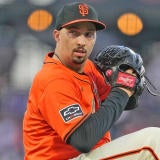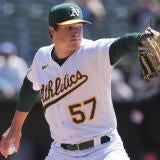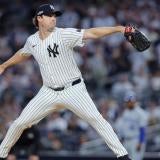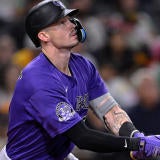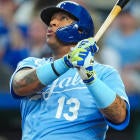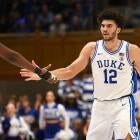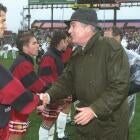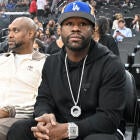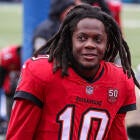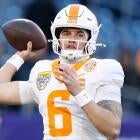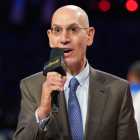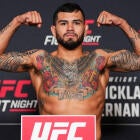2024 Fantasy Baseball All-Stars: Selections include Royals catcher Salvador Perez, more
Chris Towers provides his criteria for picking a Fantasy baseball All-Star team at the midpoint of the season

There's a big philosophical debate when it comes to selecting the MLB All-Star team. Should it just represent the players who were the best to that point in the season, or should a player's overall track record play into the decision-making process? I can see both sides of the debate – I think rewarding the best players in any given season should be the goal, but I'm also willing to use a bit of a "lifetime achievement award" mindset when it comes to breaking ties.
Picking a Fantasy All-Star team comes with different, but more straightforward criteria. I want to reward the best players, sure, but value also plays a bigger part. Bobby Witt has been the best shortstop in Fantasy, but not by a big enough margin to make up for the fact that Gunnar Henderson was generally drafted two full rounds behind him.
So, this isn't just a list of the best players in Fantasy at each position, but also the best values based on where they were – if they were even drafted! If you've got a bunch of these players on your team, you're probably doing pretty well, though that's not the only thing I'm looking for here: I'm also going to give you my thoughts on what each player's outlook should look like the rest of the way.
Before we get to that, one last reminder: I'm looking for questions for a mailbag later this week to kick off the second half, so send them my way at FantasyBaseball@CBSi.com with the subject line "Ask FBT" to be included. Got trade questions? Need to make some tough roster choices? Just have some general questions about the state of Fantasy Baseball? Send them my way, and I'll pick the most interesting to be included.
Also, make sure you check out Fantasy Baseball Today from Monday, as Frank Stampfl and Chris Welsh broke down the MLB draft, including some early First-Year Player Draft rankings discussions for a class that could make an impact at the major-league level as soon as next season. Plus, Frank, Scott White, and myself will be on CBS Sports Network today at Noon, ET, for a special live edition of FBT, where we'll be talking more Fantasy All-Star picks, our biggest surprises from the first half, and a whole bunch more.
Now, let's talk first-half All-Stars.
2024 Fantasy All-Stars
Catcher: Salvador Perez, Royals
Perez cooled off from a blazing start, but he's still the No. 3 catcher and on close to a 30-homer, 110-RBI pace with a .282 average. Perez was the No. 6 catcher taken, so you could make a case for someone like Logan O'Hoppe belonging here, but Perez's bounceback when most had counted him out as an elite producer earns him the nod here.
What does the second half hold? We've already seen pretty significant regression, as Perez hit just .194 in the month of June, and maybe we're starting to see the impact of playing every day as a 34-year-old. But the underlying numbers are even better than the actual marks – he has a .379 expected wOBA, much better than his .350 actual mark – and that's good reason to believe he'll remain excellent moving forward.
First base: Josh Naylor, Guardians
Naylor has just been an RBI machine, ranking fourth in the majors in the category despite a pretty underwhelming .246 average. He's already hit a career-high 22 homers, and is benefitting from Progressive Field suddenly playing like a bandbox – it has been the fifth-easiest park to homer in this season after ranking dead last in 2023. Naylor is top 10 in the majors in homers and RBI, and he's 30th in runs scored, to boot.
What does the second half hold? Naylor has always produced a ton of RBI, with a 162-game pace since 2022 of 120. His expected stats are a smidge better than his actual numbers – most notably his .273 xBA compared to his actual .246 mark – which makes me think he should remain an absolute must-start player moving forward.
Second base: Brice Turang, Brewers
Turang was a complete afterthought this spring, entering the season as the No. 35 second baseman in NFC drafts; he's a top-35 overall player so far, thanks to a position-best 30 steals. There isn't much else that stands out about Turang, though going from a total zero as a hitter to a pretty good one (.731 OPS) has helped the speed play up.
What does the second half hold?
This feels like a profile with an awfully thin margin for error. Turang is an improved hitter from his rookie season, but the underlying numbers suggest there's been some good fortune here – he has a .303 xwOBA compared to a .323 actual mark. Speedy slap hitters can confound those stats with their ability to steal an extra hit or two here and there, but this one feels like a situation where the bottom could truly fall out. I wouldn't be opposed to trying to move Turang, especially if I'm well positioned in steals already.
Third base: Alec Bohm, Phillies
Bohm was already 24 when he established himself as an everyday player, so most (myself included!) didn't think there was going to be a ton of room to grow. But he's just consistently improved a little bit every year, culminating in career-best production across the board. Like Naylor, Bohm is an RBI standout, thanks to his prominent spot in a very good lineup and his ability to consistently put the ball in play – remember, he drove in 97 runs last season despite being a pretty average hitter. He's been a lot better than average this season, ranking top-five among 3B in average while making up for limited over-the-fence pop with a league-best 33 doubles. He's been a standout in any fantasy format.
What does the second half hold? Bohm has improved his expected wOBA by at least 10 points every season since 2021, and he's up to a .363 mark this season. There's been a bit of regression lately, but not a ton, as he continues to make consistent contact while tapping into a smidge more pull-side power this season. He's not a superstar, but I don't expect things to get much worse for him, either.
Shortstop: Gunnar Henderson, Orioles
Henderson is the No. 2 shortstop in Fantasy and a top-five player, and he has absolutely played his way into the first-round conversation and then some. He has 10 more homers than anyone else at the SS position, and he's also already eclipsed last year's stolen base total with 14. Given his very good speed, that was something we were hoping to see, but it was no guarantee. It's kind of just icing on the cake as with Henderson establishing himself as a truly elite power threat, but that's how you become a top-five player.
What does the second half hold? Henderson is currently on pace for 48 homers, and I'll take the under on that number. But he was an elite prospect who produced at a high level as a rookie, so I'm not particularly interested in betting against him, even if I don't expect him to be quite this good the rest of the way.
Outfield: Jarren Duran, Red Sox
What's interesting here is that Duran hasn't really been that much better than he was a year ago. Don't believe me? Here's his five-category production from last year pro-rated to this year's plate appearances:
2023: .295 average, 56 runs, 10 HR, 49 RBI, 29 SB
2024: .284 average, 62 runs, 10 HR, 41 RBI, 22 SB
It's actually eerie how similar his numbers look, though it's worth noting that he's playing more regularly, including against lefties this season, which makes his production much more impressive. Still, Duran showed us this kind of potential a year ago; now, he's just living up to it.
What does the second half hold? The underlying numbers back it up in addition to last year's numbers being bang-on, so I don't see much reason to be skeptical at this point. Duran is a star.
Outfield: Brenton Doyle, Rockies
Already an elite defender and baserunner, Doyle's bat has caught up in a hurry this season, as he has cut 10 points off his strikeout rate and unlocked some of the plus raw power he only hinted at last season. He already has five more homers than he had all of last season, and his batting average is 73 points higher, to boot. Believe it or not, Doyle is a top-five outfielder and top-20 overall player in Roto scoring this season.
What does the second half hold? So, the story would be a lot different if the season ended at the actual halfway point, because Doyle's OPS was down below .700, with just seven homers at the end of June. He's gone bonkers in July, hitting eight homers with a 1.576 OPS, which feels like he's definitely benefiting from his hottest streak coming at the exact right time. Doyle should be useful, but he feels like a fairly obvious sell-high candidate heading into the second half.
Outfield: Jurickson Profar, Padres
Profar made the actual All-Star team, and he ended the first half hitting .305/.394/.476 after going undrafted in all but the deepest leagues. And the underlying numbers back it up, for the most part – his .366 xwOBA is 60 points better than last season and 28 points better than his previous career best. At 31, Profar is somehow a better version of himself than ever.
What does the second half hold? Look, this is a former top prospect, so maybe it's just a really, really delayed breakout? I'm pretty skeptical of that case, but it is a case you could make, especially given the dramatically improved underlying skill set. I think a second-half repeat is unlikely, but I've been stubbornly wrong about him all along, so what do I know?
Designate hitter: Elly De La Cruz, Reds
I had to add the DH spot here for arguably the player of the first half. Every hot streak and slump was met with countless victory laps, but the overall picture is clear: De La Cruz is a difference-making player, even if he certainly isn't a perfect player, by any means. Yeah, he strikes out a ton, but he has taken a big step forward against lefties and might steal 80 bases with 30 homers.
What does the second half hold? There will probably be some 30-game stretch in the second half where he has an OPS below .700 and there might be another round of "I told you so's," but De La Cruz is a first-round pick next year barring a collapse that I frankly don't see coming.
Starting pitcher: Chris Sale, Braves
Sale's career has been derailed by injuries, but the underlying skill set has generally still looked pretty strong, and we're seeing that he can still pitch like an ace when healthy. The Braves are managing his innings well, and he might just win his first (somehow!) Cy Young Award.
What does the second half hold? I think it's reasonable to think Sale has more injury risk than most pitchers, but it's hard to ding him for that at this point when so many other pitchers have gotten hurt and he's still standing. I don't have many doubts about his ability to keep pitching like an ace, so the only real knock here is the volume – he'll likely make one or two fewer starts than other high-end pitchers if the Braves keep finding ways to get him an extra day of rest every turn through the rotation.
Starting pitcher: Seth Lugo, Royals
Two years ago, Lugo was a reliever, which makes his emergence this season as one of the league's premiere workhorses all the more surprising. Only Logan Gilbert has thrown more innings than Lugo at the break, and only Reynaldo Lopez, Tarik Skubal, and Corbin Burnes have a lower ERA. With a preseason ADP outside the top 250, you can make a case Lugo has been the best value in Fantasy this season.
What does the second half hold? Worse, surely. I'd bet on an ERA at least a run higher than his current mark, though that should still keep Lugo safely among the ranks of the must-start in Fantasy. That being said, he's also less than 20 innings from his career high, so how he'll hold up remains to be seen. Lugo isn't much of a strikeout pitcher, so I think there might be a slimmer margin for error here than you'd like, with an ERA over 4.00 well within the realm of possibility – his xERA is currently 3.93, for what it's worth.
Starting pitcher: Ranger Suarez, Phillies
Suarez was drafted even later than Lugo, and if not for a couple of minor injury issues, he would be right there with him in both volume and excellence. He has combined near-career-best strikeout numbers with the best control of his career, plus improved groundball tendencies. It's a heck of a package right now.
What does the second half hold? The thing with Suarez is, he's never managed to put it together for a full season. He had an incredible closing stretch to the 2021 season, but couldn't quite follow it up in 2022 with similar success. Suarez has already started to show some signs of regression lately, allowing 15 earned runs over his final three starts heading into the break. I expect further regression, though I do still expect Suarez to be someone you want in your lineup moving forward.
Relief pitcher: Garrett Crochet, White Sox
Crochet had some flashes as a reliever, but there's a reason pretty much everyone joked about him being named the White Sox Opening Day starter. And yet here we stand at the break with Crochet leading the majors in strikeouts and leading the AL in FIP – with no real signs of slowing down, as he had a 2.06 ERA with 65 strikeouts in 43.2 innings since June 1.
What does the second half hold? Of course, we know Crochet is going to slow down. We saw a stark reminder of that in his final start before the break, as the White Sox limited him to just 28 pitches over two shutout innings. Crochet had never thrown more than 65 innings in a season prior to this one – heck, he had thrown just 85.1 innings in four seasons as a professional prior to getting to 107.1 before the break. Crochet isn't your typical young pitcher, but he's also already in uncharted territory with his workload, so who knows if you'll even be able to rely on him for 50 more innings the rest of the way.
Relief pitcher: Tanner Scott, Marlins
Scott was the source of much panic this spring, and I was definitely among the worriers. All he's done is pitch to a 1.34 ERA and put himself back in the discussion to be one of the biggest names moved at the deadline. There's no guarantee he'll be moved to a closer role, he'll almost certainly be playing on a better team than the Marlins in a few weeks.
What does the second half hold?
Of course, it's not all good news. Scott's strikeout rate is lower than it has been since 2020, while his walk rate is nearly double last season's; he's gotten by on a mixture of excellent results on balls in play (nothing new for Scott, to be fair) and some good luck. If he gets traded somewhere he can be the closer, I expect Scott will still be a very useful Fantasy option, but that's certainly no guarantee at this point. I'd be looking to trade him right now if I could.

